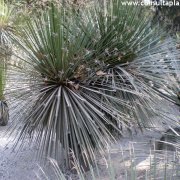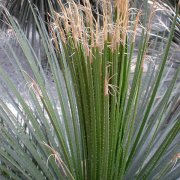Care of the shrub Dasylirion parryanum or Parry's Sotol |
|
The genus Dasylirion, family Asparagaceae, includes 20 species of palm-like perennials native to Mexico and the southwestern United States. Some species are: Dasylirion parryanum, Dasylirion longissimum, Dasylirion glaucophyllum, Dasylirion acrotrichum, Dasylirion serratifolium, Dasylirion texanum. Common name: Parry's Sotol. This species is native to San Luis Potosí, Aguascalientes and Guanajuato, Mexico. They are slow-growing evergreen plants that can branch out and reach 1 meter (3.28 feet) in height. The leaves are green, up to 70 cm (2.29 feet) in length, have yellowish spines on the margin and at the tip the typical plume of white fibers that plants of this genus have. They produce numerous small cream-yellow flowers in long panicles about 3 meters (9.84 feet) high. They bloom in the second half of spring and early summer. Parry's Sotol is used in gardens in groups of 3-4 specimens, as isolated specimens and in rockeries and gardens of succulents and cacti. Dasylirion parryanum is suitable for large pots to decorate patios and terraces especially in regions with a Mediterranean climate. Dasylirion parryanum needs full sun exposure as it grows on rocky slopes in desert areas. It resists frosts down to -5 ºC (23 ºF) as long as the substrate is dry. The soil can be a mixture of 1/3 leaf mulch, 1/3 garden substrate, and 1/3 coarse sand. Parry's Sotol resists drought very well; water moderately, always waiting for the substrate to dry. In winter the waterings are better not to water them especially if they are grown outdoors. These low maintenance plants do not need pruning or fertilizers. Dasylirion parryanum is a plant resistant to pests and diseases but sensitive to excess watering. Parry's Sotol propagates by seeds sown in spring but it's a very slow process. |
Images of the shrub Dasylirion parryanum or Parry's Sotol |
Find plants
Dasylirion parryanum or Parry's Sotol | Care and Growing
© 2026 FavThemes

